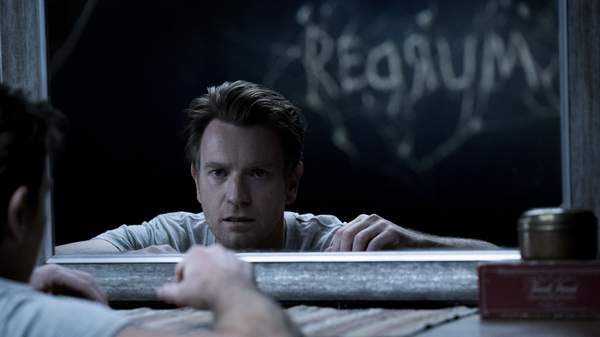Overview
A river of blood cascading from an elevator. Creepy twins eager to play forever. The eerie woman in room 237. Since Stanley Kubrick brought Stephen King's horror novel to cinemas in 1980, these images have become synonymous with The Shining, as has the word 'redrum' and frosty hedge mazes. But, really, this story owes a debt to ice cream. That's not how King's 1977 book starts, or Kubrick's masterpiece; however Dick Hallorann's (Scatman Crothers) telepathic offer of dessert to five-year-old Danny Torrance (Danny Lloyd) is one of the movie's pivotal moments. It's when audiences learn what the film's title means, and discover they'll be spending time in the duo's heads while they communicate without moving their lips.
Doctor Sleep — which hit bookshelves in 2013 as a King-penned sequel to The Shining and now reaches theatres under the direction of Mike Flanagan (The Haunting of Hill House) — latches onto that idea. In its predecessor, the Overlook Hotel that Danny and his parents (Jack Nicholson and Shelley Duvall) temporarily called home also had a "shine", turning it into a ghostly battlefield — but in Doctor Sleep, the characters' minds become a combat zone as well. Danny is now Dan (Ewan McGregor), a drifter who finds the straight and narrow in a small New Hampshire town, yet remains haunted by his boyhood experiences. He connects with fellow telepath Abra (Kyliegh Curran), a teenager whose powers eclipse his own. They initially chat without chatting, until Abra glimpses a sinister group of nomadic quasi-immortals who possess the same extrasensory gifts and consume the essence of psychic folks.
Led by the malevolent Rose The Hat — who's played with menacing relish by Mission: Impossible – Fallout's Rebecca Ferguson, complete with Babadook-style headwear — this death cult earns Doctor Sleep's considerable attention. Sometimes, they recruit their potential victims. Mostly, they kill them, inhaling their shine or "steam". In Abra's case, the group is ravenous for — and frightened by — her potent power. As a face-off looms, Dan, who is still mentored by the spirit of Hallorann (now played by Carl Lumbly), adopts the same role for Abra. While the film takes its time teasing out Dan and Abra's individual stories, bringing them together and depicting Rose's twisted reign, it's always headed in one direction: to the Colorado hotel that has lingered over cinema history for nearly four decades.
In a movie where getting into someone's head is crucial — and thriving on what you extract out of it, too — Doctor Sleep does the filmic equivalent with The Shining. King famously hated Kubrick's adaptation, even scripting his own TV version in the 90s. By writing Doctor Sleep, he attempted to reclaim his own story and put it back on his preferred path. Flanagan, however, has no such qualms about one of the best horror movies ever made. On the screen, Doctor Sleep begins with notes from The Shining's main theme, and the nods and winks only continue. He recreates scenes, mirrors visual motifs, uses snippets of the original, and finds aesthetic, narrative and thematic ways to allude to Kubrick's film. The picture's nostalgia is never as gratuitous and empty as Ready Player One's reference to the movie, thankfully, but it still traces its predecessor's footsteps more closely than it needs to.
It can't be easy, making a sequel to an iconic book-to-film adaptation that also adapts the follow-up novel addressing the author's issues with the first movie. It's to Flanagan's credit that Doctor Sleep wholeheartedly tries to juggle these competing aims. An accomplished horror writer/director/editor with fellow King adaptation Gerald's Game to his name, he infuses Doctor Sleep with growing dread and gnawing unease. Never just trying to ape Kubrick, he crafts his own standout images — involving Rose and her cronies at their most frenzied, and literally stepping inside Dan, Abra and Rose's minds. Also boasting top-notch lead performances, a thoughtful exploration of childhood trauma and its impact, and an unnerving score, Doctor Sleep builds its own momentum and intrigue. Inevitably, though, it starts chasing The Shining's tail too blatantly and feverishly.
Doctor Sleep was never designed to stand alone, but by remaining so beholden to The Shining, it can feel like a missed opportunity. It doesn't need to prop itself up so forcefully, or to imitate Kubrick so stringently, and proves a much better film when it's doing neither. In rare scenes where the sequel interrogates rather than apes the original movie, Doctor Sleep is far more convincing in linking the two. When Dan admits to an Alcoholics Anonymous meeting that he drank because that's how he connected to the memory of his dad, it's the picture's most powerful moment — and shows why McGregor is perfectly cast to wade through Dan's niggling pain. It's also a way to take viewers both into the character's head, and into The Shining, without being so overt. The film still shines more often that not, but if only the bulk of Doctor Sleep had that same gift.
Features
Information
When
Thursday, November 7, 2019 - Wednesday, December 11, 2019
Thursday, November 7 - Wednesday, December 11, 2019
Where
Various cinemas in WellingtonWellington
Price
$15–25-
Event Type
